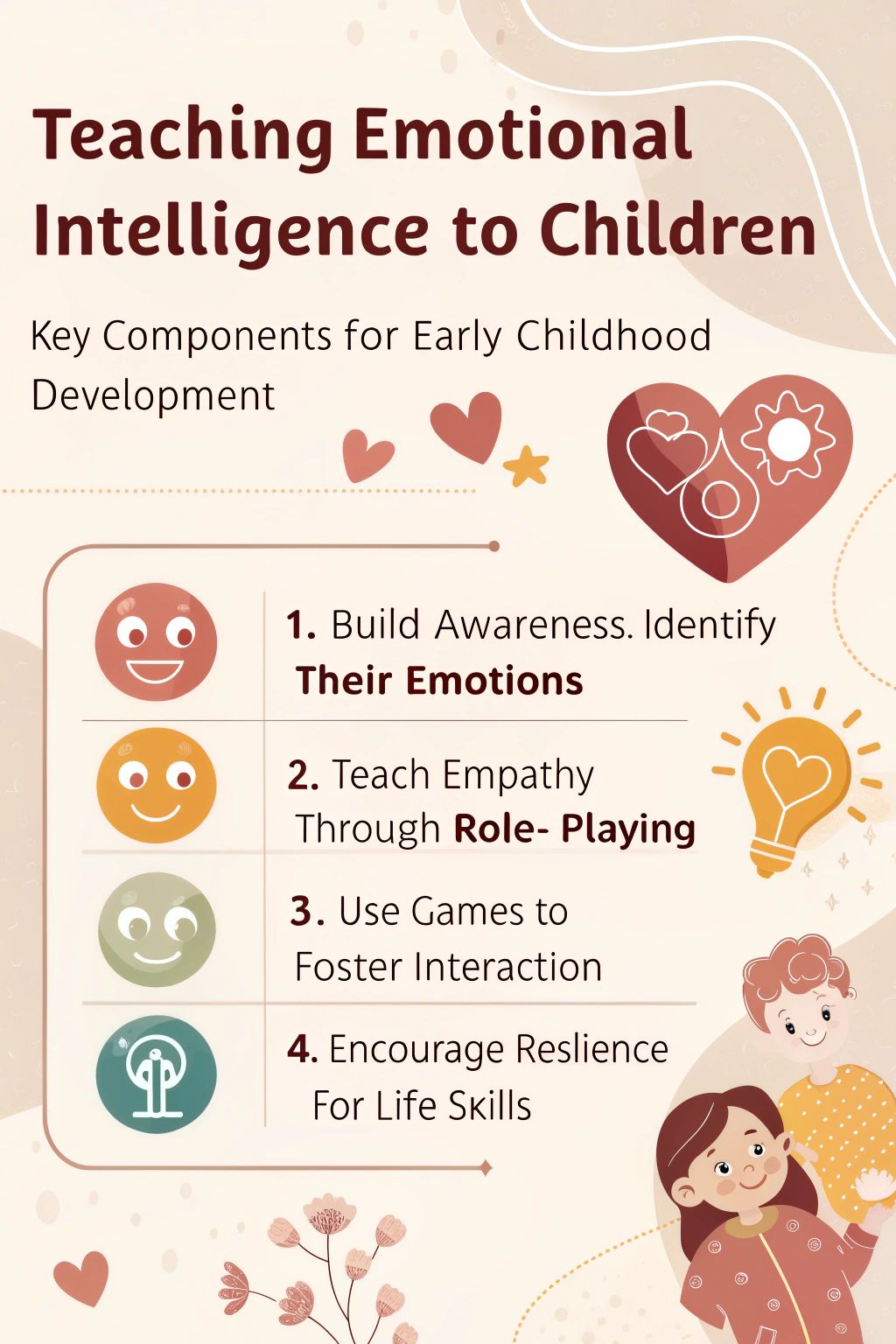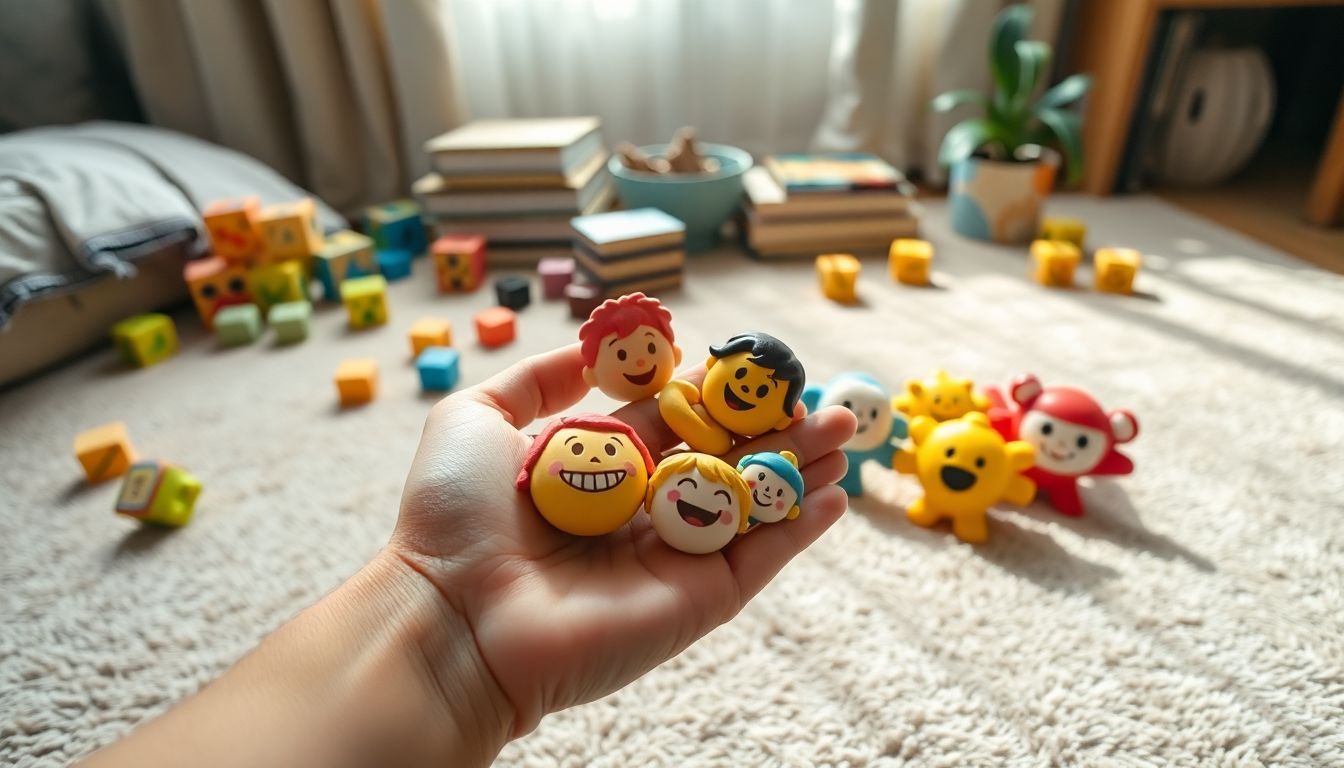Parents commonly express concern for their children’s scholastic capabilities, but emotional intelligence holds equal merit. Emotional intelligence aids children in coping with challenges effectively and comprehending their feelings as well as others’.
Daniel Goleman, with his work on the matter, highlighted this aspect. He provided evidence that emotional intelligence significantly influences a child’s achievement.
This blog will discuss imparting emotional intelligence to children. The importance of emotional intelligence in the initial years of childhood will be highlighted and methods through which you can support your child in cultivating these key competencies will also be presented.
Insights on how to teach self-awareness, empathy, and more by using straightforward everyday activities will be provided. All set? Let’s initiate our discussion.

Understanding Emotional Intelligence in Children

Understanding emotional intelligence in children involves recognising and fostering their capacity to perceive, understand, and manage emotions. This is essential for their social and emotional development, enabling them to navigate relationships effectively and make informed decisions based on their emotions.
Definition of Emotional Intelligence
Emotional Intelligence (EI) signifies the capability to identify, comprehend, and control our own emotions. It also incorporates comprehending the emotions of others. Daniel Goleman highlighted five key sections of EI: self-awareness, self-regulation, motivation, empathy, and social skills.
These elements assist us in tackling challenges and cultivating robust relationships.
Conventional IQ tests do not evaluate EI. However, it is key for personal achievement and enhancing social connections. Individuals utilise emotional intelligence in every facet of life from decision-making to efficacious communication with others.
Unlike unprocessed intellect that stays relatively fixed throughout life, individuals can advance their emotional abilities over time with practice and guidance.
Importance in Early Childhood Development
Emotional intelligence (EI) is an influential aspect in early childhood development. It lays the groundwork for a child’s future learning and relationships. Studies indicate that children with high EI show improved attention, memory, and academic performance.
They also have more robust mental health. From a young age, children who comprehend their emotions can manage classroom challenges more effectively. They also harmonise well with others.
Educating children on how to regulate feelings during these developmental years is paramount. Techniques such as deep breathing assist them with immediate responses to anger or frustration.
As they grow, they acquire more intricate skills like empathising with another person’s perspective. This readiness paves the way for positive interactions throughout their lifespan.
Early guidance and practice in emotional regulation help children mature into resilient adults, capable of successfully managing both personal and professional relationships.
Key Components of Emotional Intelligence for Children
Young children develop emotional intelligence through key components such as self-awareness, self-regulation, empathy, social skills, and motivation. These components play an essential role in their early development by fostering the ability to recognise and manage their emotions effectively.
Self-awareness
Self-awareness lays the bedrock for emotional intelligence. It revolves around acknowledging personal feelings and deciphering their influence on others. Instruments like the mood meter contribute to enhancing this perceptiveness.
With these tools, children can learn to identify and articulate their emotions precisely, establishing a solid basis for managing feelings effectively. This skill is absolutely vital as it aids young individuals in understanding how their emotions influence those around them.
The process of imparting self-awareness begins at an early stage, assisting children in gaining a profound comprehension of themselves and their relation to others. It holds a significant role in emotional competence, setting a basis for purposeful interactions with peers and adults.
Through activities that promote reflection on personal experiences and emotions, children acquire an understanding of their own emotional worlds. To build other aspects of emotional intelligence such as empathy, social skills, and motivation, such introspection is exceedingly important.
Self-regulation
Self-regulation plays a critical role in managing one’s emotions. It involves managing emotional responses and avoiding quick, impulsive actions. This proficiency aids children in thinking prior to reacting and deciding how to express their feelings in uplifting ways.
Pertinent strategies such as focused breathing and taking brief pauses can substantially support this process. Samuel’s example illustrates how recognising frustration and seeking assistance are components of effective self-regulation.
Educators and parents can steer children towards self-regulation development through explicit teaching and exemplifying good behaviour. Utilising instruments like mood meters provide a visual representation of children’s emotions, simplifying their comprehension and management.
Persuading children to apply these strategies not only assists in emotion regulation but also enhances their overall social and emotional learning, laying a robust groundwork for healthy emotional growth.
Empathy
Empathy involves understanding others’ feelings. It assists children in forming stronger relationships and lessening tension. Children can learn empathy by participating in community service, an activity that instils in them a sense of compassion and prosocial behaviour.
This element of emotional intelligence plays a key role in the development of a child.
Teachers utilise storybooks to guide children towards a better understanding of empathy by discussing the emotions of the characters. Simulating scenarios also educate children on how to empathically respond in different situations.
These techniques simplify their ability to comprehend and express their own emotions positively, leading to increased emotional intelligence (EI) levels.
Social skills
Social skills are pivotal in shaping the way children engage with others and form positive bonds. They assist kids in comprehending the emotions of their peers. These skills can be imparted effectively by simulating various circumstances for role-play.
This approach accords children the chance to rehearse reactions to diverse social situations in a governed surrounding. They acquire the ability to emote suitably and interpret silent signals like body language.
Adjustments can be made to classroom exercises based on emotional signals, instilling in children an understanding of how their conduct impacts others. For instance, if a child recognises sadness or distress in a classmate, they can learn apt methods of offering aid, perhaps by embracing or inquiring if they’d like to discuss the issue.
Such occurrences are important in cultivating empathy and mutual comprehension among peers at an early phase of life.
Motivation
The role of encouragement in fostering emotional understanding in children is significant. By urging children to define their ambitions and persist even in challenging circumstances.
The esteemed psychologist, Daniel Goleman, emphasises that determination is one of the five fundamental elements of emotional understanding. This implies aiding your child in fostering a robust desire to accomplish personal goals whilst confronting difficulties.
Promoting your child in this manner imparts them a valuable life skill: tenacity. It instructs youngsters to keep advancing towards their objectives without caving in easily. Educators and caregivers can assist by defining transparent goals and celebrating minor victories alongside the child.
This affirmative feedback makes learning about emotions more engaging for youngsters and reinforces their ambition to excel in various dimensions of life, including managing emotions effectively.
Practical Methods to Teach Emotional Intelligence
Teaching emotional intelligence to children means applying practical techniques, such as introducing the mood meter, engaging in role-play for various situations, and discussing feelings through storybooks.
These methods are designed to assist children in acquiring important abilities for expressing emotions, comprehending the feelings of others, and managing their own emotions efficiently. By engaging in these activities, children can grasp how to identify and categorise emotions, consequently improving their emotional consciousness and compassion towards others.
Introducing the mood meter
The mood meter is an essential tool for enhancing emotional awareness in children. It features four quadrants – red, blue, green, and yellow – which helps children understand their feelings more effectively.
The simplified version of the mood meter is specifically designed for children aged 3–8 and operates using two axes: pleasantness ranging from -5 to +5 and energy levels from -5 to +5.
This practical approach aids in teaching kids how to express healthy emotions and manage their feelings appropriately. By integrating the mood meter into daily activities, parents and educators can provide actionable guidance on emotional intelligence skills while also encouraging open conversations about emotions with young learners.
Role-playing different scenarios
Teaching children emotional intelligence involves enacting different scenarios. By addressing separation anxiety and employing empathy charades, children learn to understand and manage their emotions effectively.
Enacting also includes imaginative play, which allows children to express and understand emotions like anger or sadness in a safe and controlled environment. These methods provide practical experiences for children to recognise and regulate various emotions, laying a strong foundation for their emotional development.
Enacting scenarios help children develop vital social skills that contribute to their overall emotional competence as they navigate early childhood experiences. The interactive nature of these activities encourages active participation from the child, making it an engaging and effective way to build essential emotional skills.
Incorporating characters or toys into the enactment can further enhance the learning experience by allowing children to project their emotions onto external entities, fostering deeper understanding and regulation of feelings.
By integrating varied scenarios into teaching emotional intelligence, educators and parents can support young children’s early school success by providing them with the necessary tools for recognising, regulating, and expressing emotions effectively from an early age.
Using storybooks to discuss feelings
Storybooks offer a valuable platform for discussing and exploring feelings with young children. By exploring characters’ emotions, these books assist children in developing emotional vocabulary and understanding.
This interactive approach encourages children to express their own feelings and comprehend the diverse range of human emotions. Furthermore, utilising storybooks as a tool for discussing feelings fosters empathy and social skills in early childhood development.
It also enables parents and educators to facilitate open conversations about emotions, laying the foundation for healthy emotional expression.
Emotional Intelligence and Its Impact on Relationships
Emotional intelligence (EI) significantly impacts relationships, with higher EI in adults, particularly educators, positively linked to enhanced interpersonal connections. Improved EI promotes healthier relationships and reduces stress levels.
Furthermore, children demonstrating higher emotional intelligence show better behaviour regulation and empathy.
Early school success in young children is closely linked to their ability to recognise emotions and label them accurately. In addition, teaching children how to regulate their emotions enables them to express themselves appropriately in various social contexts while effectively managing their responses to others’ feelings.
Notably, psychologist Daniel Goleman asserts that emotional intelligence plays a crucial role in developing a prosocial orientation and the regulation strategies that assist children in navigating different social situations within the early childhood classroom setting.
Integrating Emotional Intelligence into Daily Activities
Teaching emotional intelligence to children involves integrating it into daily activities, fostering awareness and understanding of emotions in practical ways. Read more about how to nurture emotional intelligence in young minds and support their healthy development.
Mood tracking with children
Children’s emotional development can greatly benefit from integrating mood tracking into daily routines. By encouraging children to regularly check in with a mood meter, parents and educators promote increased emotional awareness.
Practical methods like mood tracking provide children with the tools to recognise and manage their emotions effectively. Daily mood tracking fosters self-awareness and helps children develop important skills for emotional regulation, setting them on a positive path towards understanding and managing their feelings as they grow.
Incorporating regular checks of the mood meter into daily activities creates an environment where children can become more mindful of their emotions, leading to enhanced emotional intelligence.
This approach equips them with the necessary skills to navigate their feelings and interactions with others, fostering healthy social and emotional development from an early age.
Encouraging open conversations about emotions
Moreover, facilitating these open dialogues contributes to establishing a secure environment where children feel empowered to express their emotions appropriately. This method not only assists in fostering resilience but also improves the child’s capacity to regulate emotions efficiently.
The influence extends beyond personal growth, playing a notably significant role in building stronger connections with peers and adults, thus establishing a sturdy basis for emotional well-being throughout their childhood and beyond.
Setting examples through parental emotional responses
Educators and parents should demonstrate emotional regulation strategies for children to learn from. Parental modelling of emotional responses significantly influences children’s emotional intelligence (EI) development, emphasising the importance of parental influence on a child’s developing EI.
Strategies include deep breathing, reframing situations, and taking breaks as effective ways to show healthy emotional responses for youngsters. By demonstrating these methods, parents not only ensure they provide an example for their children to follow but also actively contribute to their child’s early grasp of managing emotions and building resilience.
Parental modelling is vital in shaping a child’s ability to understand and regulate emotions effectively. It promotes self-awareness and self-regulation skills in young learners while establishing a foundation for healthy emotional experiences later in life.
According to eisenberg et al., 2015; spinrad et al., 2006 entities who model positive emotion regulation strategies aid the development of preschoolers’ emotional competence which positively impacts social competence during their early school years (Denham et al., 2012).
Furthermore, research shows that compromised parental emotion regulation can lead to negative outcomes such as occupational burnout (Koyuncuoglu & Sayil, 2020), stressing further importance on setting examples through proactive parental emotional responses.
Games and Tools to Enhance Emotional Intelligence
Games and tools can undoubtedly play an essential role in enhancing emotional intelligence in children. Including activities such as the “Feelings in a Jar” game, emotion coaching using toys and tools, and emotional intelligence card games can offer interactive ways for children to recognise, understand, and manage their emotions.
These engaging resources certainly provide practical avenues for children to improve their emotional awareness and social skills, essential components of emotional intelligence development.
The “Feelings in a Jar” game
The “Feelings in a Jar” game serves as a powerful tool for expanding children’s emotional vocabulary. It comprises 365 emotion words and can be used to prompt conversations and the identification of emotions, equipping children with a wider grasp of their feelings.
This interactive tool aids children in articulating their emotions more effectively and enhances their ability to acknowledge and express various feelings, nurturing crucial emotional intelligence skills from an early age.
By integrating the “Feelings in a Jar” game into educational environments or family activities, children acquire valuable insights into the complexities of human emotions, establishing a solid foundation for developing empathy, self-awareness, and social skills.
This captivating resource ignites open discussions about emotions among children, prompting them to embrace their own feelings while also fostering an understanding of the diverse range of emotions experienced by others.
Through this process, children not only grasp how to express their own emotions but also become skilled at identifying and respecting the feelings expressed by those around them.
Emotion coaching using toys and tools
To enhance emotion coaching in children, the use of specific toys and tools can be particularly effective. For instance, the “Kimochi: Bella Rose” plush toy is designed to teach empathy through a Feel Guide, promoting discussions about feelings and emotions.
Moreover, employing “Thoughts and Feelings Speaking Cards,” tailored for ages 4 and above, can facilitate the expression of emotions by illustrating various emotional states. These resources not only aid in cultivating a child’s emotional intelligence but also create opportunities for meaningful conversations about their feelings and interactions with others.
Utilising these toys fosters an environment where children can learn to recognise and express their emotions effectively. Such engagement with interactive materials contributes significantly to the development of crucial components of emotional intelligence such as empathy, self-awareness, and social skills.
Emotional intelligence card games
Emotional intelligence card games can be valuable tools for helping children develop their emotional awareness and regulation skills. For example, the *Conversational EQ Card Game* is tailored for ages 5 and up and utilises a 54-card deck to facilitate discussions about emotions, providing an engaging way for kids to explore and express their feelings.
Another example is *The Social and Emotional Competence Game*, which focuses on key aspects such as caring, communication, and cooperation, all of which are vital components of emotional intelligence that significantly contribute to a child’s social-emotional development.
These card games offer practical methods to teach children about emotional expression and regulation in a fun and interactive manner while fostering important skills like empathy, self-awareness, and effective communication.
By utilising these games as part of educational strategies focused on emotional intelligence, parents and educators can effectively support young learners in developing crucial socio-emotional competencies necessary for healthy relationships and overall well-being.
Conclusion
In summary, educating children about emotional intelligence is essential for their early development. By cultivating self-awareness, self-control, empathy, and social skills, we provide them with the necessary tools to manage relationships and comprehend their emotions.
Practical approaches such as tracking moods and open discussions offer actionable guidance for parents and educators to bolster this vital aspect of childhood development. Integrating emotional intelligence into daily routines fosters a supportive setting that nurtures children’s emotional competence and resilience from a young age.
MindOwl Founder – My own struggles in life have led me to this path of understanding the human condition. I graduated with a bachelor’s degree in philosophy before completing a master’s degree in psychology at Regent’s University London. I then completed a postgraduate diploma in philosophical counselling before being trained in ACT (Acceptance and commitment therapy).
I’ve spent the last eight years studying the encounter of meditative practices with modern psychology.

